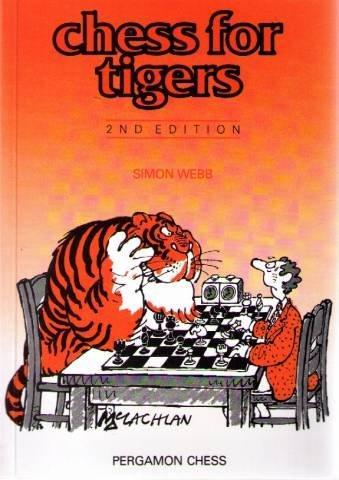
Chess.com for Tigers (An homage to Simon Webb)
Copyright © 2019 Ammerbucher - All rights reserved.
Do you know “Simon Webb: Chess for Tigers”?
When I learned and played chess in a club (as a teenager), that was one of my first two chess books – and I loved it. Not only because it is funny and very easy to read, but because it is very useful.
The subtitle of the (latest) German edition is “How to win in chess” – and that is the point, isn’t it?
Webb’s tiger chess approach is about using any (legal) means on and off the board. From good preparation, over the improvement of your play, to psychological tricks, particularly in a (club) match. Webb shows you how to deploy your strength optimally, how to exploit your opponents weaknesses, how to bring the game into a position which suits rather your than your opponents playing style, and how to prevent silly mistakes. (I guess the latter is a topic I have to read again and again … ;-) )
Sadly, Webb has died in 2005 (he has been killed by his own son at the age of 55), so there will be no new edition for playing tiger chess on internet sites like this. (However, it might be still available in your country – at least as an e-book -, and if you don’t own it yet, I would highly recommend to buy it.)
This book came in my mind when I started to write about the use of some of the features here on chess.com in Daily chess. Until then, I had only planned to write two chapters (one of them about how to win a position where Caruana only reached a draw ![]() ). But suddenly I noticed a pattern: Many things you can find and use here can be seen under the aspect of Webb's tiger chess. So I got the idea to make a series about that ...
). But suddenly I noticed a pattern: Many things you can find and use here can be seen under the aspect of Webb's tiger chess. So I got the idea to make a series about that ...
To make two things clear at the very beginning:
First, Tiger chess (at least as far as I understand it) means trying to win with any available means. But it does not mean cheating! Forbidden help and unfair play just is not an available means. A tiger is a respectful being, he is watchful and dangerous, but not a cheater. A tiger uses his own strength, and exploits the weaknesses of his opponent. But even if a tiger might use some tricks, he still plays fair and respects the rules! He even holds aloof from dangerous ground, and will not do anything that could be regarded as unfair or cheating. There is always a broad line between tiger chess and unfair play.
And I, for my part, would even keep more distance to some things than Webb did. (For example his psychological ruses.) So I will, if necessary, always make clear here what is allowed and what might be regarded as cheating or unfair play.
Second, I am no pro. I am just a normal hobby player. And it is surely unusual that somebody of my – relatively - poor strength writes about chess. However, I do not want to write about things like great openings, attacking schemes and other specific things like that. I want to write about my experiences here, on this site, particularly about the use of the tools here, how you – possibly – can make the most out of them. Exactly what Webb would have done if he had been here: Tiger chess on Chess.com.
Of course I do not write for players better than me. I write mainly for newbies, or players, let’s say, below 1400 here (in Daily Chess). And as far as I can see, there is not much writing here on such practical questions.
However, I also do invite better players than this (and me) to read this blog as well. Because I may be wrong in many cases, I may make mistakes. Then please tell me, particularly if you know it better. Only if we are criticized (by words or by the better moves of our opponents) we can improve.
